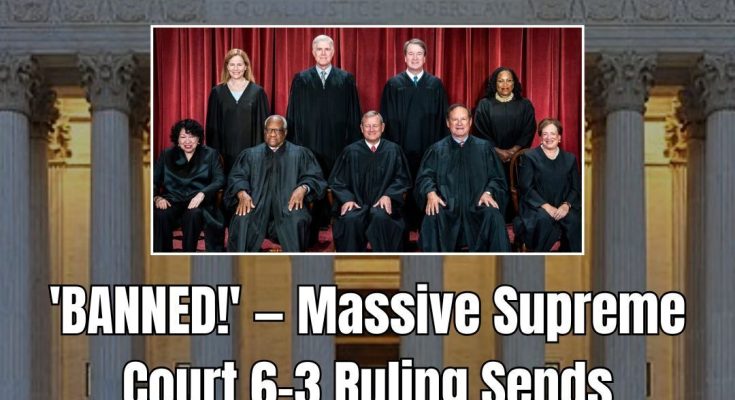
This article may contain commentary
which reflects the author’s opinion.
The Supreme Court handed President Donald Trump a significant victory Monday, ruling he can remove FTC Commissioner Rebecca Slaughter after months of legal challenges.
Trump has sought to dismiss Slaughter, a Democrat appointed by former President Joe Biden, since March. The court also agreed to consider whether presidents may dismiss FTC commissioners without cause.
In the meantime, NBC News reports, Slaughter will not be allowed to remain in office.
The 6-3 decision Monday followed an earlier order by Chief Justice John Roberts blocking Rebecca Slaughter’s reinstatement. Slaughter was one of two Democratic commissioners Trump dismissed in March, along with Alvaro Bedoya, who later dropped his legal challenge. Slaughter’s seven-year term was set to run until 2029, making her the last Democratic appointee on the commission.
In July, a federal judge sided with Slaughter, citing the 1935 Humphrey’s Executor v. United States ruling, which limited presidential authority over the FTC. Trump’s Justice Department has argued that the president has the power to remove commissioners at will.
“The president and the government suffer irreparable harm when courts transfer even some of that executive power to officers beyond the President’s control,” Solicitor General D. John Sauer argued.
The Supreme Court, by a 6-3 margin, agreed. Monday’s ruling, per the Associated Press, signaled “the conservative majority is poised to overturn or narrow a 1935 Supreme Court decision that found commissioners can only be removed for misconduct or neglect of duty.”
That final decision is likely to come soon. The high court will hear oral arguments on the case in December.
Last week, the Supreme Court handed a major defeat to California’s climate radicals, and even one liberal justice joined the conservative wing to make it happen.
In a 7-2 ruling, the court cleared the way for the state’s energy producers to move forward with their lawsuit against the U.S. Environmental Protection Agency, targeting California’s extreme green energy mandates. At the heart of the case is the state’s requirement that electric vehicles dominate the market by 2035, part of Gov. Gavin Newsom’s plan to force California into “carbon neutrality.”
Justice Brett Kavanaugh, writing for the majority, made it clear these mandates are not just heavy-handed but potentially illegal.
“The government generally may not target a business or industry through stringent and allegedly unlawful regulation, and then evade the resulting lawsuits by claiming that the targets of its regulation should be locked out of court as unaffected bystanders,” Kavanaugh wrote.
“In light of this Court’s precedents and the evidence before the Court of Appeals, the fuel producers established Article III standing to challenge EPA’s approval of the California regulations,” he added.
Kavanaugh also pointed out that the EPA has shifted its own legal arguments over time, a fact that did not help its case.
“EPA has repeatedly altered its legal position on whether the Clean Air Act authorizes California regulations targeting greenhouse gas emissions from new motor vehicles,” he noted.
The ruling comes on the heels of President Trump’s decisive action earlier this month, when he signed three resolutions wiping out key parts of California’s left-wing green agenda. The Trump administration’s move was a massive blow to Democratic Gov. Gavin Newsom, a likely 2028 presidential contender, and his push to transform the state into the most “progressive” climate state in the country.
“This case involves California’s 2012 request for EPA approval of new California regulations,” Kavanaugh explained in his decision. “As relevant here, those regulations generally require automakers (i) to limit average greenhouse gas emissions across their fleets of new motor vehicles sold in the State and (ii) to manufacture a certain percentage of electric vehicles as part of their vehicle fleets.”
Chet Thompson, president and CEO of American Fuel & Petrochemical Manufacturers, the group behind the lawsuit, hailed the ruling as a major victory.
“Congress did not give California special authority to regulate greenhouse gases, mandate electric vehicles or ban new gas car sales, all of which the state has attempted to do through its intentional misreading of statute,” Thompson told theDaily Caller.

